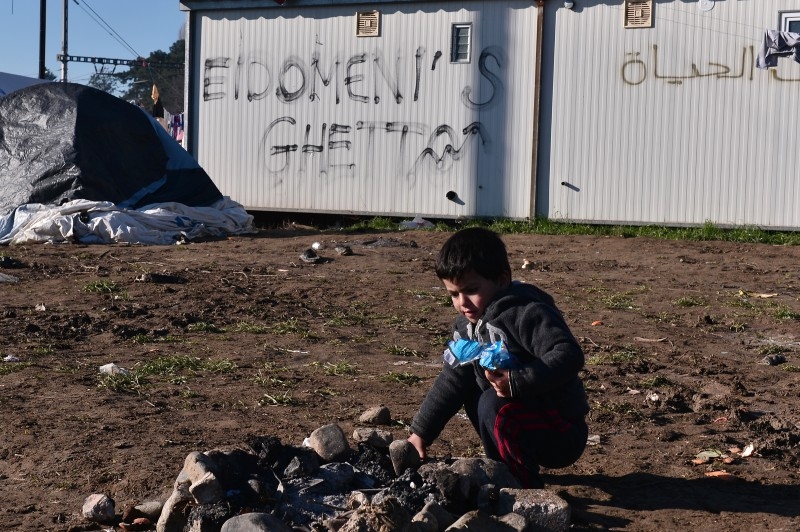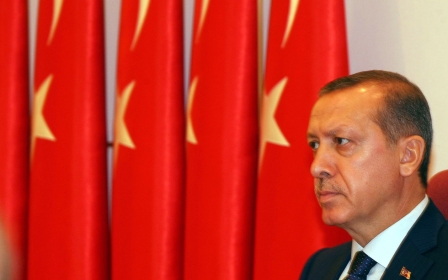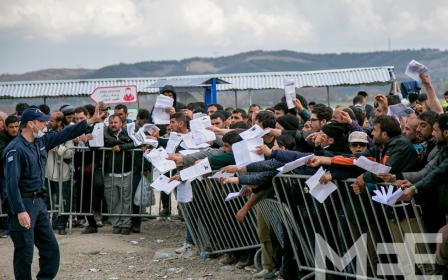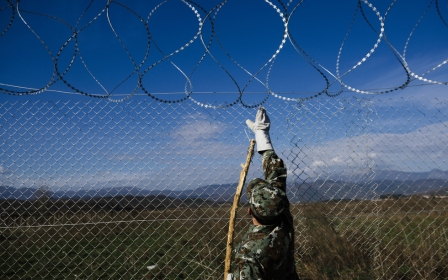Bulgaria to send troops to guard Greek border as EU-Turkey summit begins

Bulgaria will send more than 400 troops and security personnel to guard its border with Greece, amid fears the migrant flow along the Balkan route will pick up with the onset of warmer weather, the prime minister said on Saturday.
"Hundreds of people, more than 400, from the army, paramilitary police and police, will stay here permanently," said Prime Minister Boiko Borissov following security force exercises involving helicopters and armoured cars at the Greek border near Macedonia.
Another 500 security personnel could be mobilised within hours if necessary, he added.
Last month Bulgaria's parliament granted the army greater powers to help guard the country's frontiers. Previously troops were only able to provide technical and logistic support.
EU member Bulgaria already has close to 2,000 police guarding its porous 260km border with Turkey and is currently extending a 30km razor-wire fence.
The measures have helped the country remain, so far, on the sidelines of the major migrant route from Turkey and Greece to northern Europe.
However with migrant quotas introduced by Austria and Balkan nations, those fleeing war and poverty in Syria, Iraq, Afghanistan and elsewhere in the Middle East and North Africa are seeking new routes into Western Europe.
Bulgaria's 470km border with Greece is straddled by mountains, with only a third of it deemed passable for poorly equipped migrants.
About 30,000 migrants were registered in Bulgaria last year, while thousands more passed through clandestinely.
NGOs have complained of poor treatment of migrants at the hands of the Bulgarian police.
About 500 asylum seekers are housed in reception centres in the country, which is one of the poorest EU member states.
EU-Turkey summit
About 13,000 refugees are crammed in unhygienic conditions on Greece's border with Macedonia, officials said Saturday, with all eyes on a key EU-Turkey summit on Monday that is seen as the only viable solution to the crisis.
The huge influx of refugees and migrants has caused major tensions and divisions within the EU. The bloc's president, Donald Tusk, on Friday struck an upbeat note about Monday's summit in Brussels, which will include Turkey.
European leaders are expected to use the summit to press Ankara to take back more economic migrants from Greece and reduce the flow of people across the Aegean Sea.
Greece has been plunged at the heart of Europe's greatest migration crisis in six decades after a series of border restrictions along the migrant trail, from Austria to Macedonia has caused a bottleneck on its soil.
Over 30,000 refugees and migrants have been trapped in the country, around a third of them at Idomeni border crossing, where aid groups report food and tent shortages.
"There are 13,000 people here and nearly 20,000 in this prefecture, over 60 percent of the country's entire refugee and migrant flow," Apostolos Tzitzikostas, regional governor of Greece's central Macedonia prefecture, told Skai television on Saturday.
"We can no longer shoulder this strain by ourselves."
German Chancellor Angela Merkel meanwhile said Greece should have been quicker in preparing to host 50,000 people under an agreement with the EU in October.
"Greece should have created 50,000 accommodation places for refugees by the end of 2015," Merkel told Bild newspaper in an interview due to appear Sunday.
"This delay must be addressed as soon as possible as the Greek government must provide decent lodgings" to asylum claimants, she said.
Greece sent in the army in February to speed up the creation of open camps for migrants and refugees but has occasionally run into opposition from local authorities.
New MEE newsletter: Jerusalem Dispatch
Sign up to get the latest insights and analysis on Israel-Palestine, alongside Turkey Unpacked and other MEE newsletters
Middle East Eye delivers independent and unrivalled coverage and analysis of the Middle East, North Africa and beyond. To learn more about republishing this content and the associated fees, please fill out this form. More about MEE can be found here.




